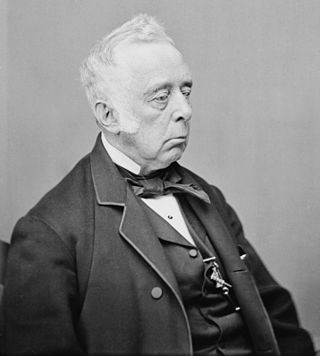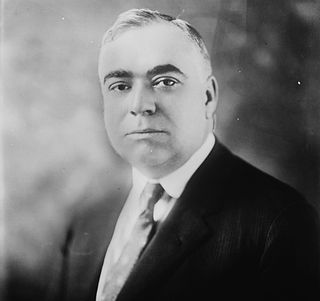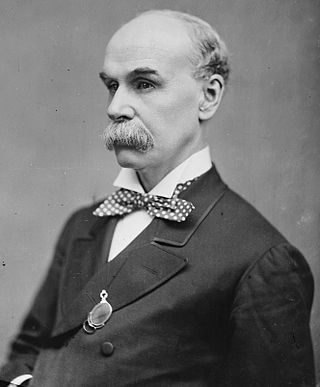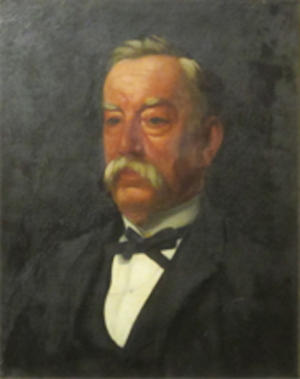
Reverdy Johnson was an American politician, statesman, and jurist from Annapolis, Maryland. He gained fame as a defense attorney, defending notables such as Sandford of the Dred Scott case, Maj. Gen. Fitz John Porter at his courts-martial, and Mary Surratt, alleged conspirator in the assassination of Abraham Lincoln. A former Whig, he was a strong supporter of the Union war effort. At first he opposed wartime efforts to abolish slavery until 1864, and in 1865 supported the 13th Amendment banning slavery.

Harry Whinna Nice was an American politician and a member of the Republican Party who served as the 50th Governor of Maryland from 1935 to 1939.

William Pinkney Whyte, a member of the United States Democratic Party, was a politician who served the State of Maryland as a State Delegate, the State Comptroller, a United States Senator, the 35th Governor, the Mayor of Baltimore, Maryland, and the State Attorney General.

Oden Bowie, a member of the United States Democratic Party, was the 34th governor of the State of Maryland in the United States from 1869 to 1872.
Benjamin Tasker Sr. was the 21st Proprietary Governor of Maryland from 1752 to 1753. He also occupied a number of other significant colonial offices, including, on various occasions, being elected Mayor of Annapolis.
Robert Charles Murphy was a Maryland lawyer and jurist. He served as Chief Judge of the Maryland Court of Appeals, the state's highest court, from 1972 to October 9, 1996, the same that day he turned 70 years old. Seventy is the Maryland State Constitution's mandatory retirement age for judges, which Murphy unsuccessfully attempted to raise to 75 years old. Murphy was 45 years old when he was appointed by then Governor Marvin Mandel, making Murphy the youngest chief judge in Maryland state history.

Hugh Lennox Bond was a United States circuit judge of the United States Circuit Courts for the Fourth Circuit.

William Paca was a Founding Father of the United States who was a signatory to the Continental Association and the United States Declaration of Independence. He was a Maryland delegate to the First Continental Congress and the Second Continental Congress, governor of Maryland, and a district judge of the United States District Court for the District of Maryland.

Somerville Pinkney Tuck Jr. was an American diplomat.
John Johnson Jr. was the last Chancellor of Maryland, serving in that office from to 1846 to 1851.
Colonel Sir John Digby Mills was a British Conservative Party politician and British Army officer. He served as Member of Parliament for New Forest and Christchurch from 1932 to 1945.
John Johnson Sr. was a Maryland attorney and judge, and the fourth Chancellor of Maryland, from 1821 to 1824.

Hudson Snowden Marshall was the United States Attorney for the Southern District of New York from 1915 to 1917.

Angela M. Eaves is an American lawyer and judge. She is a justice of the Supreme Court of Maryland. She served as an administrative judge for the 3rd Judicial Circuit for Harford County from 2015 to 2022.

Somerville Pinkney Tuck was an American judge who served on the International Court of Appeals in Egypt and was regarded as "one of the leading jurists and lawyers of Europe."
Justice Tuck may refer to:
Captain Alexander John Marshall Tuck MC was an American soldier and businessman who was prominent in society.

Stevenson Archer Williams was an American politician and businessman. He served in the Maryland Senate in 1898 and 1900–1901, and was an unsuccessful candidate for governor in the 1903 Maryland gubernatorial election.
Édouard Gustav Bunge was a Belgian businessman, banker, and philanthropist. He was a close associate of Leopold II and one of the main investors in the Anglo-Belgian India Rubber Company and the Société Anversoise du Commerce au Congo, which exploited rubber in the Congo Free State.
William Pinkney Maulsby was an American politician, lawyer and judge from Maryland. He served in the Maryland Senate from 1838 to 1843, and as a justice of the Maryland Court of Appeals from 1870 to 1871.











